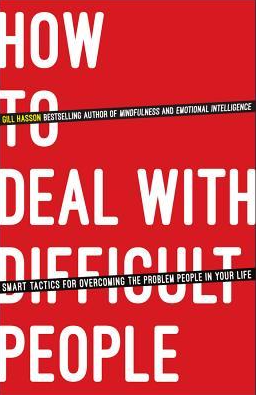Some people know exactly how to be difficult. They’re the people who bring you down with their negativity, criticism or anger. They refuse to cooperate. They’re irritating, frustrating and often infuriating. And if you respond to someone else’s difficult behaviour with anger and blame, withdrawal or compliance, you may end up feeling guilty, stressed or depressed. What to do? One obvious solution is to calmly walk away from them. This is easier said than done.
You can’t directly change other people’s behaviour; the only thing you can change is how you respond and deal with it. Consider different ways you deal with difficult people and try to understand why you react to them in the way you do.
Consider the expectations and beliefs you may have about the ways other people ‘should’ behave towards you. Remember other people can’t make you do anything, behave in a certain way or feel in a certain way; they’re not responsible for how you feel or respond – you are.
Taking responsibility for your reactions to difficult people will help you better manage. If you can take responsibility for your responses then, those responses are yours to manage: to influence and direct.
After thinking about how and why you and other people behave and respond to each other as you do. It is then important to learn skills, strategies and techniques to manage difficult people: to know what to say and what not to say. A good way to know what to say and what not to say to a difficult person is to start by listening to them. Really listen.
You can choose whether to tell other people what you think, how you feel and what you believe. Even if an encounter with a difficult person doesn’t turn out the way you hoped, don’t feel guilty, angry or resentful, instead simply reflect on and identify what you would do differently next time, in a similar situation. Be calm, confidently stand up to others and know when to walk away. As a result other people are more likely to treat you in the way you want: with respect.
If you can understanding how and why someone else is being difficult it can give you a better chance of dealing with them. It’s not always easy to tell if someone is deliberately being difficult or if it’s just you who is struggling to deal with that person. At times it’s not what other people do that’s the difficulty, it’s how you interpret it.
Your values are the principles by which you live much of your life. Your values can also act as an anchor: they can be relied on to support and stabilize you. Your values also reflect your expectations about the way other people ‘should’ behave. So if decisiveness and reliability are important to you, you will probably expect others to behave in the same way; to make clear decisions, be definite, resolute and determined, dependable and committed. When other people don’t behave in ways that reflect your values or in ways that you think are important – you may respond with disappointment, resignation,
frustration or anger. Problems will occur if you expect a higher level of action or reaction than the other is either willing or capable of.
Try to avoid high expectations and stay in a place of positive expectation with other people. It’s a powerful way to change the way you think about difficult people.
Personal rights are what you perceive to be the correct, just or appropriate way to be treated. This includes what you believe you are entitled to. When you stand up for your rights, they can protect yourself from ill treatment by other people. Your rights are reflected in your values; your values will inform your rights. Be aware that someone else’s personal rights will be based on their experiences and expectations, so they may well be different from yours.
Communication tips include using active and reflective listening with open questions, often summarising what they have said to confirm understanding. Confirmation provides clarity – be sure to acknowledge and respond only to what is relevant. Acknowledging what the other person has said shows that you have listened and understood. It also gives them the opportunity to confirm, clarify or refute your understanding. Match your body language with your words and observe others doing this. If someone is not doing matching their words and language then consider why – perhaps they are not telling the truth?
When negotiating try to find common ground for a solution. Offer an alternative that works for you and benefits the other person as well.
Remember to choose where and when: Time and place. It may not be appropriate to respond to the other person immediately, for example in front of other people or if one of you is stressed. However, if you have to wait for an appropriate time and place, don’t let things build up to such an extent that they just get worse. Tackle it as soon as possible.
You don’t even have to tell the other person what the consequences will be if they don’t cooperate with you. But if you do explain what the consequences will be, take responsibility for the outcome: there may also be consequences for you.
Take responsibility for your opinions: Start with ‘I’ and not ‘you’. A sentence that starts with the word ‘you’ is probably going to involve an accusation against the other person that will alert them to become defensive. ‘I’ statements, on the other hand, will give the other person less to challenge: they can argue with you if you say, ‘You always let me down…’ but not with ‘I always feel let down…’., ‘You make me feel…’ suggests you are blaming the other person, making them responsible for how you feel. Blaming someone else is not going to solve the problem, so take ownership of what you have to say and take responsibility for what you think or feel.



